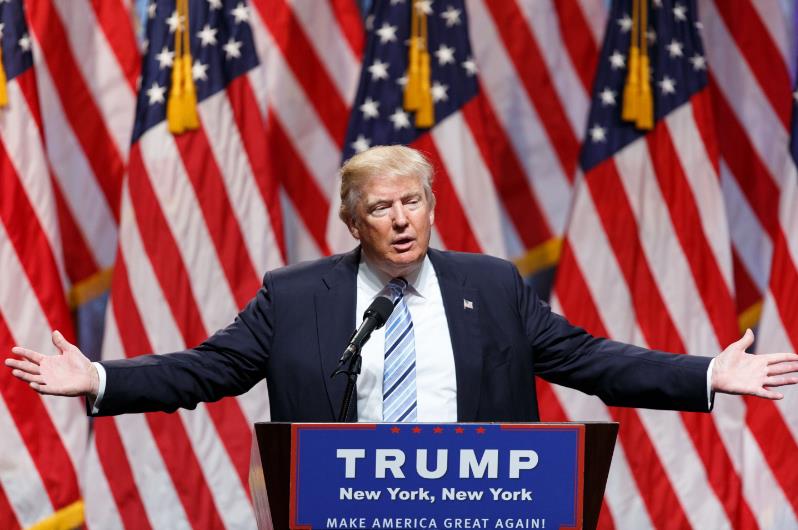Media Report

- The Wall Street Journal reports: "Beijing may believe that Mr. Trump is bluffing when he threatens sweeping tariffs on Chinese imports; the official media have portrayed him as more of a clown than a menace. But it had better brace for the consequences of a populist revolt that swept him to victory...The damage to U.S. democracy from an ugly election campaign—and now a polarized country—underscores the Communist Party's propaganda message to the masses that it alone stands between order and chaos...His election may well kill off Barack Obama's signature foreign-policy initiative, the 'pivot' to Asia...Yet it is the American security guarantee that has kept the peace in East Asia and allowed the world's most dynamic region to focus on growth...In office, Mr. Trump will discover an enduring reality, as his predecessors did: No global problem can be solved without China's help"
- Reuters reports: "Donald Trump's upset election victory cracks open pressing strategic and economic questions in U.S.-China ties, and has likely surprised and worried Chinese leaders, who prize stability in relations between the two powers...Beijing tends to prefer incumbent party successors with consistent policy lines. Trump's lack of a governance track record and his unorthodox take on long-held Republican priorities could prove a headache for Chinese officials. Jia Qingguo, the dean of the School of International Relations at China's elite Peking University and a government advisor, called Trump 'a symbol of uncertainty. China hopes the United States' future policy would be more certain because in this way, we can prepare and deal with it,' Jia said...Chinese President Xi Jinping congratulated Donald Trump on winning the U.S. presidency [saying]...'I place great importance on the China-U.S. relationship, and look forward to working with you to uphold the principles of non-conflict, non-confrontation, mutual respect and win-win cooperation."
- The New York Times comments: "Until Monday, Beijing had not issued its own interpretation of any clause in the Basic Law without being asked for an interpretation by the Hong Kong government or judiciary. In this case, it intervened to say that office holders must "sincerely and solemnly" take loyalty oaths. Beijing's unilateral move was a heavy-handed attempt to silence democratic voices...China's tightening hand is undermining Hong Kong's economic model...China cannot afford to erode that credibility, especially when its own economy is struggling. Nor can China afford to stoke further unrest, which makes Hong Kong less attractive for investment and sends an ominous signal to Taiwan...Activists like Ms. Yau and Mr. Leung are choosing to defend the rule of law; they merit strong international support."
Calendar
- 2016-11-08 The Latest: US Upset Over China's Hong Kong Intervention
- 2016-11-07 The coming clash with China over North Korea
- 2016-11-06 China Says Two Elected Hong Kong Lawmakers Can't Retake Oaths
- 2016-11-04 China’s Wanda Group to Buy Dick Clark Productions for About $1 Billion
- 2016-11-03 China Slowdown Deepens Looming Pension Crisis
- 2016-11-02 Separatist Hong Kong Lawmakers Draw Blunt Response From China
- 2016-11-01 After U.S. Election, Expect Hardening on China
- 2016-10-31 Made in China: Once known for cheap knockoffs, Chinese companies are now world's innovators
- 2016-10-30 Russia Welcomes Growing Wave of 'Red Tourists' From China
- 2016-10-28 Philippines says Chinese ships have stopped chasing Filipino fishermen from contested shoal
News
- The Wall Street Journal In Trump Win, China Hopes for U.S. Retreat
- Reuters For China, Trump win creates uncertainty, opportunity
- The BBC Trump wins US election: How world leaders have reacted
- The Independent Chinese state media says that Donald Trump as president is what happens if people have democracies
- The New York Times Chinese Journalists Get an Exhilarating Look at the U.S. Election
- CNBC What's in a name? Trump is winning big on China's stock market
- Bloomberg China Coal Giants Ink Supply Deals in Effort to Ease Prices
- CNN Money Jack Ma warns of 'disaster' if President Trump doesn't work with China
- The Wall Street Journal Donald Trump's Victory Casts Shadow on Hollywood's China Business
- The Financial Times China card curbs stem cash flow to Hong Kong insurance plans
- The Financial Times Brussels moves to strengthen China steel tariffs
- BBC Tianjin chemical blast: China jails 49 for disaster
- Bloomberg News Chinese Stock That Sounds Like 'Trump Wins Big' Wins Big
Commentary
- The New York Times China Bullies Hong Kong
- CNN Trump's challenge: Can he stop conflict in the South China Sea?
- Bloomberg Gadfly Trump's China Wall
- The Washington Post China cluelessly turns Hong Kong against it
- The Wall Street Journal Trump and China: America's Most Important Economic Relationship Just Got Very Complicated
- The Wall Street Journal Reason Gets Trumped on Chinese Stock Market During U.S. Election
- Foreign Policy China Just Won The U.S. Election
